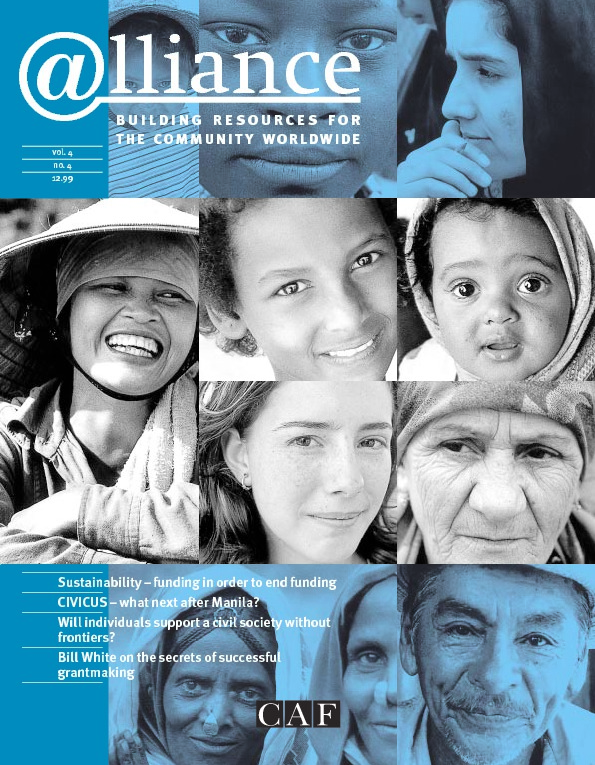Funders face some key dilemmas when supporting small, locally based NGOs and community groups. What kinds of funding patterns best help them to sustain and develop their organizations? What strategies should funders adopt to make sure their funding ‘works’? Does the labour-intensive work of getting hold of funding always pay off?
These dilemmas were highlighted by recent research among 16 such organizations in London and Sheffield, UK, across the period 1987–97.[1] A range of funding regimes can be identified — multiple funders, one major and one minor funder, or dependency on a single funder — but none appears more likely to support organizational growth than another.
Trends expected and unexpected
Important trends emerged. Not surprisingly, the negative effects of annual ‘panic fundraising’ were widely cited by NGOs — ‘we have to be seen to be doing a hell of a lot of things all the time’ and to ‘over-emphasize what we are doing’. All this absorbs organizational resources and makes it chronically difficult to plan strategically, which can leave small organizations vulnerable.
A number of more unexpected results of funding also came to light. In one worst-case scenario, funding appeared to ‘kill off’ a London organization, which had previously drawn its energy from its volunteer membership. The successful acquisition of funding for new premises and a paid worker led to volunteers melting away, organizational overburdening and the decision to close within two years, after a proud decade of community work. While the organization had long campaigned for the funding and would not have considered refusing support, in this situation it seemed that the grant was not the ‘golden egg’ that was anticipated.
For another NGO, success in gaining EU and National Lottery grants meant that the local community would pressure it to do even more, just at the point when it needed to stand back and take stock of its work. In yet another organization, a funder’s provision of resources to research the case for expansion was perceived by members as ‘a cruel trick’ when that funder was then unwilling (or unable) to follow through with support for the recommended expansion.
It seems that many NGOs see all ‘funders’ as forming a single, homogenous group – informal information-sharing among funders may partly account for this impression. While funders may not share this view, it does raise some further questions. How far should funders go in finding out if organizations are playing them off against other funders? To what extent, if at all, should they share with each other what they know about organizations’ viability and quality of work from their monitoring and evaluation exercises?
From survival to sustainability
Important messages emerge from both sides of the funding relationship. Voluntary organizations felt that they could move from survival to sustainability if funders provided core funding, supported strategic ‘thinking time’ and liaised with fellow funders to reduce costly juggling exercises in pursuit of funding. Common application forms and shared monitoring and evaluation processes, for example, could greatly reduce the volume of paperwork which can be such a crushing burden for small organizations.
For their part, funders felt that organizations should develop medium-term financial and management planning to help reduce the emotional as well as practical pressures of annual grant-chasing and to help avoid over-reliance upon key workers. The importance of succession planning for these key roles – as well as for management committees / boards of trustees — is seen as paramount.
The search for ‘one best funding pattern’ clearly represents a non-profit sector Holy Grail, more myth than reality, though the journey itself may be illuminating. Meanwhile, small organizations should be warned to ‘expect the unexpected’ when their longed-for (and often deserved) funding finally arrives.
1 Commissioned by the South Yorkshire Community Foundation, this research is published in Making Funding Work: Funding regimes and local voluntary organizations (1999) by Pete Alcock, Jenny Harrow, Rob Macmillan, Jeremy Vincent and Sarah Pearson. Price £12.95 plus p&p. To order, contact York Publishing Services: Tel +44 1904 430 033 Fax +44 1904 430 868
Jenny Harrow is Head of the Centre for Public Services Management at South Bank University, London. She can be contacted via email at JenHarrow@aol.com
Jeremy Vincent is a research fellow at the University of East London. He can be contacted at jvincent3@hotmail.com





Comments (0)